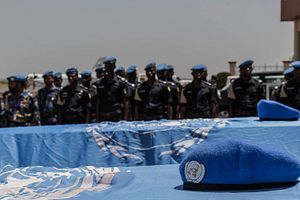A Chinese member of a United Nations peacekeeping mission was among four killed in attacks targeting UN facilities in Gao, Mali this week. According to the UN News Center, the peacekeeper died when a “vehicle-borne improvised explosive device detonated” at the camp of the United Nations Multidimensional Integrated Stabilization Mission (MINUSMA). Twelve more peacekeepers were injured in that attack, including four Chinese according to China’s Foreign Ministry.
A separate attack against a UN contractor affiliated with the international body’s Mine Action Service left three dead (one French contractor and two local security guards). Al-Qaeda in the Islamic Maghreb (AQIM) appeared to claim responsibility for the attacks by announcing they had fought a “battle” against “crusader occupation forces” in Gao.
In a statement, UN Secretary-General Ban Ki-moon expressed “outrage” at the “terrorist attacks” carried out early on Wednesday morning. The statement noted that violence targeting the UN mission in Mali has spiked recently: “[T]he recent series of attacks directed against MINUSMA… have killed 12 peacekeepers and injured many more in May alone.”
Just two days prior to this attack, five Togolese peacekeepers were killed in “deadly ambush” in central Mali. Overall, 60 peacekeepers have been killed while on duty with MINUSMA, more than on any other action UN peacekeeping mission.
China responded swiftly, with Foreign Ministry spokesperson Hua Chunying confirming the Chinese casualties in a press conference on Wednesday. In addition to expressing “our deep condolences to the victims and sincere sympathies to the bereaved families and the injured,” Hua denounced the attack as “a grave crime that cannot be tolerated.”
“We ask the Mali government and the UN to carry out immediate investigation into this terrorist attack, hold the perpetrators accountable, and work closely with China to deal with the follow-up work,” she said.
Sadly, this isn’t the first time Beijing has had the occasion to work with Mali to investigate the death of Chinese nationals. In November 2015, three Chinese civilians were among 27 hostages killed in an attack on the Radisson Blu Hotel in Mali’s capital, Bamako.
In his statement, Ban repeated “the long-standing demand to ensure that MINUSMA forces are adequately equipped to operate in a dangerous and unpredictable environment such as Mali.” The statement said the secretary-general would present “proposals to strengthen the mission’s posture and capabilities” to the UN Security Council “in the coming days.”
Ban will likely find a strong backer for such proposals in China, and not only because Chinese peacekeepers are now counted among the direct causalities of the violence against MINUSMA. Even before that China has counted itself a strong supporter of UN peacekeeping missions. As Hua pointed out in her briefing, “At present, over 2,400 Chinese peacekeepers are conducting UN peacekeeping operations in 7 African mission zones, including Mali, Democratic Republic of Congo and Liberia.” In fact, MINUSMA is one of two UN missions to which China has deployed force protection units (the other being UNMISS in South Sudan).
China is the 9th largest contributor to UN peacekeeping missions in the world, well above its fellow UN Security Council members. As of December 31, 2015, 3,045 Chinese police, military experts, and troops were deployed on peacekeeping missions (the majority, as Hua noted, in Africa). Among permanent UNSC members, France comes next with less than one-third of China’s total (934 total personnel deployed); Russia and the United States were tied at 80 apiece.
But China is not content with that level of commitment, and in fact announced an ambitious plan to bolster peacekeeping forces in general and African security in particular during President Xi Jinping’s attendance at the UN General Assembly last September. Xi announced China’s plan to create a new, permanent peacekeeping police squad as well as a stand-by peacekeeping force of 8,000 troops; he also promised $100 million to the African Union to create an emergency response force. As Janka Oertel noted at the time for The Diplomat, “If all of the 8,000 troops in some form or another are deployed in addition to those more than 3,000 Chinese men and women already engaged in blue helmet operations, China will be the largest troop contributing nation in the world.”
As other analysts have pointed out, China’s support for peacekeeping missions not only allows Beijing to gain military experience and capabilities, it also help bolster China’s image as a defender of – rather than challenger to – the international order specifically, and peace and stability in general. The recent death of a Chinese peacekeeper, however, is a somber reminder that taking part in UN missions is not a cost-free endeavor.
































